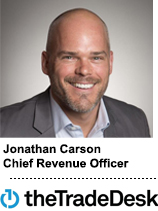 When Jonathan Carson became The Trade Desk’s first-ever chief revenue officer last week, the company was at an inflection point.
When Jonathan Carson became The Trade Desk’s first-ever chief revenue officer last week, the company was at an inflection point.
The Trade Desk has soared since its IPO, going from just a shy of billion in value in 2016 to about $9 billion now. To date, however, The Trade Desk has succeeded primarily by consolidating the independent programmatic ecosystem.
The “storm and stress” elsewhere in the ad tech market this year (i.e. bankruptcies and unfavorable exits) is due in part to The Trade Desk winning in the category, Carson said.
The next stage of the company’s growth will mean winning in new and less favorable programmatic arenas – namely, in China and other international markets and in the television industry.
Carson’s appointment as CRO points to The Trade Desk’s need to restructure for these new digital media environments, which are rooted in the traditions of old media.
As former CRO of Vevo, a video hosting platform founded as a joint venture between three legacy music studios, and previously the CEO of Nielsen’s global digital business, Carson brings a lot of experience in traditional media.
“I have an understanding of what made this place magical as a startup,” he said. “But I can also bring to the table ideas for what needs to happen structurally for the next phase of growth.”
Carson said The Trade Desk is well positioned to succeed in markets like China or Hollywood, despite their hostility to outside advertising technology entrants.
American companies trying to develop international ad platform businesses have been stymied abroad and outright blocked in China largely because they threaten incumbent media and technology, he said.
But The Trade Desk has forged partnerships with Chinese giants like Tencent and Baidu because it doesn’t own media and doesn’t compete with those social media-commerce-technology conglomerates like Google, Amazon or Facebook do.
Winning data-driven TV ad budgets isn’t like setting up a China office. But growth in TV, as with China, is about getting new stakeholders aligned on the same buying model.
“If you look at the way Nielsen developed, ostensibly they were selling data and software,” Carson said. “But ultimately what their clients buy into is a way of transacting and doing business.”
For instance, television advertisers aren’t accustomed to allocating large percentages of their media plans to tech and data vendors. For TV buyers, the software accounts for maybe a percentage point of the plan, whereas in digital media intermediaries often soak up 20-50% of the overall budget.
Part of Carson’s role will be getting those advertisers on board with a higher ratio of data and technology to actual media. People think of the ad tech tax in digital media, but Carson said he’s confident television brands will recognize the tax they pay in the form of wasted spend, like buying a whole market or program’s audience when they want a specific audience.
“Data and technology are coming into the market with addressability,” he said. “(The TV industry) should be looking at big gains and the economics will be there for all of the stakeholders improving that efficiency.”
This post was syndicated from Ad Exchanger.


More Stories
Citigroup Scales Back DEI Initiatives
Ticker: CBS News Tweaks Format of CBS Evening News
Wednesday, Feb. 19 Evening Cable News Ratings: Jesse Watters Primetime Wins in Adults 25-54